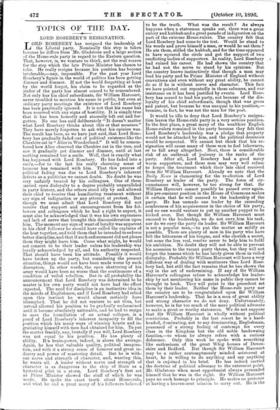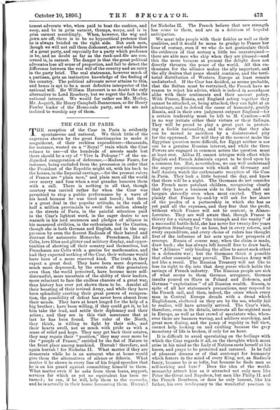TOPICS OF THE DAY.
LORD ROSEBERY'S RESIGNATION. TjORD ROSEBERY has resigned the leadership of the Liberal party. Nominally this step is taken because he differs from Mr. Gladstone and a large section of the Home-rule party in regard to the Eastern question. That, however, is, we venture to think, not the real reason for the step which the late Prime Minister has chosen to take. He really resigns because his position has become intolerable,—nay, impossible. For the past year Lord Rosebery's figure in the world of politics has been getting dimmer and dimmer. If not the world forgetting at least by the world forgot, his claim to be regarded as the leader of the party has almost ceased to be remembered. Not only has his chief subordinate, Sir William Harcourt, never troubled to mention his name in public, but even at ordinary party meetings the existence of Lord Rosebery has been practically ignored. It is not that his name has been received with any signs of hostility. It is simply true that it has been honestly and sincerely left out and for- gotten. No one has said deliberately " It doesn't matter what Lord Rosebery thinks about this or that measure." They have merely forgotten to ask what his opinion was. The result has been, as we have just said, that Lord Rose- bery has gradually faded out of political existence like the Cheshire cat in " Alice in Wonderland." It will be remem- bered how Alice observed the Cheshire cat in the tree, and saw it gradually get dimmer and dimmer, until at last nothing remained but a smile. Well, that is exactly what has happened with Lord Rosebery. He has faded into a smile,—for to the last his really charming sense of humour has remained with him. That this process of political fading was due to Lord Rosebery's inherent defects as a politician we cannot doubt. No doubt he was very unfairly treated by his colleagues. One of them -.tarried open disloyalty to a. degree probably unparalleled in party history, and the others stood idly by and allowed their chief to receive that humiliating treatment without any sign of indignation or any attempt at protest. But though we must admit that Lord Rosebery did not receive that support and encouragement from his fol- lowers and colleagues which he had a right to expect, it must also be acknowledged that it was his own supineness and lack of nerve that brought this disconsideration upon him. The moment any sign of want of loyalty was apparent in his chief follower he should have called the captains of the host together, and told them that he intended to enforce better discipline, and that if such enforcement did not please them they might leave him. Come what might, he would not consent to be their leader unless his leadership was loyally acknowledged by all, and his authority respected. That should have been his attitude. Possibly it would have broken up the party, but considering the present situation, things would not have been made worse by such disruption. In other words, the open shattering of his army would have been no worse than the continuance of a condition of veiled rebellion. But in all probability the announcement that Lord Rosebery was determined to be master in his own party would not have had the effect expected. The need for discipline is an instinctive idea in the minds of Englishmen, and if Lord Rosebery had relied upon this instinct he would almost certainly have triumphed. That he did not venture to act thus, but Instead allowed his position to be gradually undermined antil it became absolutely untenable, and he had to resign to save the humiliation of an actual collapse, is a proof of Lord Rosebery's inherent incapacity to fill the position which his many ways of winning hearts and in- gratiating himself with men had obtained for him. To put the matter frankly, nay, brutally if you will, Lord Rosebery was not equal to his position. He has plenty of ability. His brain-power, indeed, is above the average. Again, he has that valuable quality, political imagina- tion, and with it a strong sense of humour and great in- dustry and power of mastering detail. But he is with- out nerve and strength of character, and, wanting this, he wants all. A leader without nerve and strength of character is as dangerous to the ship of State as a hysterical pilot in a storm. Lord Rosebery's first act as Prime Minister showed the stuff of which he was made. He spoke the exact truth about Home-rule, and what he and a great many of his followers believed to be the truth. What was the result ? As always happens when a statesman speaks out, there was a great outcry and hubbub and a great parade of indignation on the part of the extreme Home-rulers. The country felt that Lord Rosebery had come to the test. Would he stand to his words and prove himself a. man, or would he eat them ? He ate them, stilled the hubbub, and for the time appeared to have squared the circle and got the support of two conflicting bodies of supporters. In reality, Lord Rosebery had ruined his career. He had shown the country that he bad not the nerve to stand by his opinions. But the country knows instinctively that though a man may lead his party and be Prime Minister of England without convictions and even without any great ability, he cannot do so if he is without nerve and character. This fact we have pointed out repeatedly in these columns, and our insistence on it has been justified by events. Lord Rose- bery has ceased to lead his party, not because of the dis- loyalty of his chief subordinate, though that was gross and patent, but because he was unequal to his position,— because, in fact, he was not the man for the post.
It would be idle to deny that Lord Rosebery's resigna-- tion leaves the Home-rule party in a very serious position. In the first place, a great many of the wealthier English. Home-rulers remained in the party because they felt that Lord Rosebery's leadership was a pledge that property would not be attacked by him, and the political decencies• would be respected. We cannot but think that his re- signation will cause many of these men to feel lukewarm, or to fall away altogether. Next, there is considerable risk of an outbreak of jealousy in the ranks of the- party. After all, Lord Rosebery had a good many warm supporters, and these men may very well refuse- to forget the treatment which their late chief received from Sir William Harcourt. Already we note that the Daily News is clamouring for the re-election of Lord Rosebery as leader of the party. The force of cir- cumstances will, however, be too strong for that. Sir William Harcourt cannot possibly be passed over again. His pre-eminent position in the House of Commons makes it certain that he will succeed to the leadership of the party. He has unmade one leader by the exceeding sombreness of his acquiescence in the choice of his party, and no one would venture to put up another puppet to be kicked over. But though Sir William Harcourt must succeed to the leadership, we do not envy him his task, nor do we envy the party its leader. Sir William Harcourt is not a popular man,—to put the matter as mildly as possible. There are plenty of men in his party who have felt the bitterness of his tongue, and who cherish a secret, but none the less real, resolve never to help him to fulfil his ambition. No doubt they will not be able to prevent his accession to the vacant party throne, but they will not forget the lessons which he has lately given them in veiled disloyalty. Probably Sir William Harcourt will have a very different way of dealing with mutineers than Lord Rose- bery had, but still the fact remains that he has shown the way in the art of undermining. If any of Sir William Harcourt's colleagues refuse to acknowledge his leader-. ship by not mentioning his name in public they cannot be brought to book. They will point to the precedent set them by their leader. Neither the Home-rule party nor the country are to be congratulated upon Sir William Harcourt's leadership. That he is a man of great ability and strong character we do not deny. Unfortunately, however, he is far too much of the mere political advocate to make a great or worthy statesman. We do not suppose that Sir William Harcourt is wholly without political convictions. Probably in the last resort he is a hard- headed, dominating, not to say domineering, Englishman, possessed of a strong feeling of contempt for every class in the Kingdom but the old noble landowning families,—to whom he always refers with a curious deference. Only this week he spoke with something like enthusiasm of the great Whig houses of Devon- shire and Bedford. But though Sir William Harcourt may be a rather contemptuously minded aristocrat at heart, he is willing to do anything and say anything that is enjoined in his brief. He has indeed carried the doctrine of political advocacy to the extremist point. Mr. Gladstone when most opportunist always persuaded himself that he was in the right. Sir William Harcourt pays no such homage to principle. He makes no pretence at having a heaven-sent mission to carry out. He is the honest advocate who, when paid to beat the cushion, and weep, and be in grim earnest, thumps, weeps, and is in grim earnest accordingly. When, however, the wig and gown are off, there is to be no hypocritical pretence that he is always briefed on the right side. But such men, lough we will not call them dishonest, are not safe leaders of a great party, and especially for a party which professes to be, and no doubt as far as the rank-and-file are con- cerned is, in earnest. The danger is that the great political advocates lose all sense of proportion, and fail to detect the difference between the real will of the country and an entry in the party brief. The real statesman, however much of a partisan, gets an instinctive knowledge of the feeling of the country. The political advocate never attains to this, and hence is apt to be a most defective interpreter of the national will. Sir William Harcourt is no doubt the only alternative to Lord Rosebery, but we regret the fact in the national interest. We would far rather see Mr. Morley, Mr. Asquith, Sir Henry Campbell-Bannerman, or Sir Henry Fowler leader of the Home-rule party, and we are not inclined to worship any of them.



















































 Previous page
Previous page